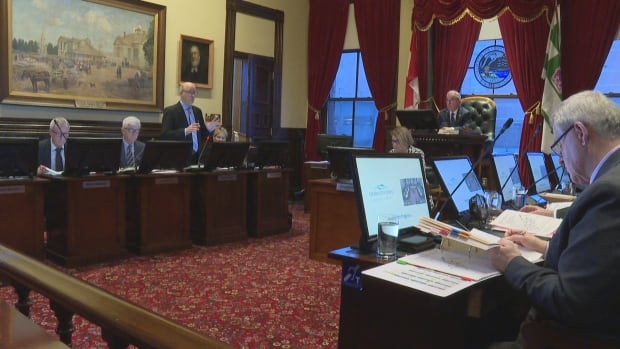Charlottetown City Council has spent more time in closed-door meetings than open sessions of council this year, according to a review of public records by CBC News.
That’s led at least one member to conclude council has been in violation of P.E.I.’s Municipal Government Act (MGA), which lays out criteria restricting the debates councils are allowed to hold in private.
“I was contacted by some residents and they’re pretty upset, they’re really upset,” Coun. Mitchell Tweel told CBC News after it was revealed council had debated and — according to Tweel and other councillors — voted down a proposal to open a warming shelter in a closed-door session earlier this month.
“Some [residents] have said this violates the Municipal Government Act, and I believe they’re right.”
Tweel and other councillors have said they thought the meeting went into a closed-door session to discuss the results of a forensic audit report, but then moved back into an open session.
“Why would a meeting of that nature be held in a closed session?” Tweel said. “What are we hiding here?”
25 hours in closed meetings
CBC News reviewed council minutes and videos posted to the city’s YouTube channel. As of Feb. 14, it appears council has spent more than 25 hours in closed sessions in 2023 — and more than 18 hours in open debate.
Under the MGA, council meetings are open to the public by default. Only under certain conditions — for example, to discuss human resource or legal matters — can councils legally move into closed session.
The act also requires councils to divulge information discussed during closed meetings “when confidentiality is no longer required.”
But it’s difficult for the public to keep tabs on whether councils are following the legislation because, at least in the case of Charlottetown, the city doesn’t inform residents about what was discussed behind closed doors.
A city spokesperson told CBC News via email that since the start of the year council has been dealing with topics “that are reasonably held in closed session,” like the forensic audit, the search for a new chief administrative officer, and budget discussions.
Closed session topics confidential, says mayor
On Feb. 2 — the date some councillors say council voted 7-2 against opening a warming shelter — Mayor Philip Brown cited section 119(1)(f) of the MGA, which allows council to go into a closed session to discuss “the conduct of existing or anticipated legal proceedings or the review of legal advice.”
Four days later, Tweel raised concerns during an open session of council about that debate taking place behind closed doors. Tweel, along with the mayor and other members of council, all said they’d gotten calls from residents about the issue.

Brown confirmed the debate was held in a closed session but denied a vote took place, saying he didn’t know how information from the session had been leaked.
“A closed session is a meeting with confidential information, so anyone who puts that information out is breaching confidentiality,” Brown said.
Councillors can be fined up to $10,000 for breaching the city’s code of conduct bylaw.
After that Feb. 6 meeting, Brown told CBC News he couldn’t say whether warming shelters were discussed in a closed session, citing confidentiality. He wouldn’t answer questions about whether such a move would contravene the MGA, or the number of times the city moves into closed sessions.
Brown also told council he would ask the city’s lawyer whether the city was in breach of the MGA for holding the debate in a closed session. In an email, a spokesperson for the city declined to provide further information, saying the city “does not release any legal opinions as these are privileged and confidential.”
‘Higher use of closed meetings’
A spokesperson with the province said municipalities have to report how many times they go into a closed session each year, and the Minister of Communities can request additional information.
“Municipal Affairs is aware that there has been a higher use of closed meetings,” the email read.

If a council were in breach of the MGA, the spokesperson said, “a warning … would be issued first, and if needed, further action may be exercised by either the department or the minister.”
The spokesperson did not respond to specific questions about the City of Charlottetown’s use of closed sessions, or which municipalities have received warnings.
Tweel says it’s time for the province to step in.
“I think we gotta put the brakes on here … because it’s not open, it’s not transparent and it’s definitely not accountable,” he said.
Summerside lists topics from closed meetings
CBC News wasn’t able to calculate how much time Summerside council spends in closed sessions because of the way the city broadcasts its council meetings, and a spokesperson said it doesn’t track how long closed meetings last.
But Mayor Dan Kutcher said his council spends more time in open sessions than closed.
Under a new measure introduced this year, council’s agendas and minutes released to the public now list details on the topics discussed during closed sessions.

For example, minutes from one closed-door portion of a meeting show council discussed the city’s eco-business park, its solar energy farm, a housing initiative and program funding through the Federation of Canadian Municipalities.
“As much as possible, my philosophy and my approach as mayor is to have open discussions in front of the public,” Kutcher said.
“I think giving the public the opportunity to see the conversations that are happening reinforces the hard work that people are putting in.… When there are difficult decisions, that doesn’t mean that they go to an in-camera [closed session]. Difficult decisions have to happen in a public forum too.”


